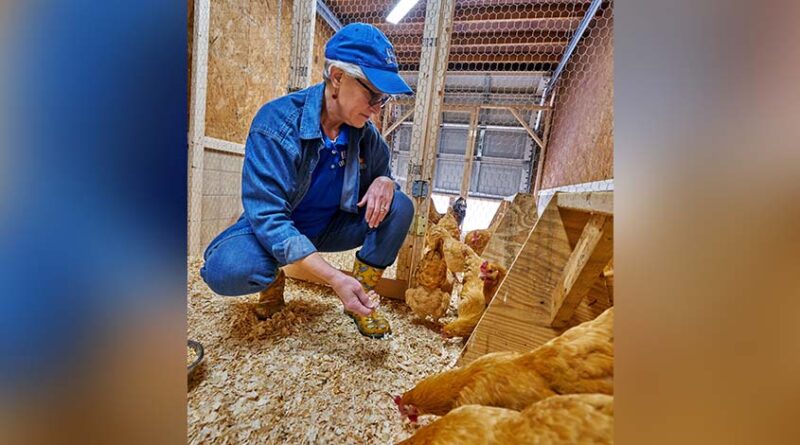Starting a Business After 55
Many Central New Yorkers over 55 are part of the national trend of retiring from or leaving long-time careers and starting a business.
By Mary Beth Roach
In 2019, 13% of Americans between the ages of 55 and 64 and 6% of those between the ages of 65 and 74 started new business, according to the Global Entrepreneurship Monitor, an annual assessment of the national level of entrepreneurial activity in multiple countries.
“We are seeing more people 55 and older looking at starting their own businesses,” said Joan Powers, Small Business Development Center regional director at SUNY Onondaga Community College.
“Some start a part-time business with the intention to grow it until they leave their ‘daytime’ jobs,” she said. “Some have been downsized or have chosen to leave their jobs early and follow their dreams of owning a business. Others have retired but still want to do something, so many become entrepreneurs. Many of the retired people have some money to invest in their businesses. Also, people older than 50 are now finding it harder to find full-time jobs, so self-employment becomes an option.”
We talked with five individuals who have recently begun this new chapter in their lives.
Lisa and Steve Stevenson
She retired from Bristol-Myers Squibb; he, from Onondaga County’s wastewater plant division. Now they operate Rent The Chicken in Hastings
When Lisa Stevenson first suggested to her husband, Steve, that they rent out chickens, he was surprised, to say the least.
“Who’s going to rent chickens?” he asked.
Now, just a couple of years into this business, Steve is surprised again — this time at the number of families who want to rent chickens.
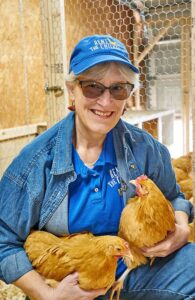 The Stevensons rent close to 100 chickens per season and they can accommodate up to 30 renters.
The Stevensons rent close to 100 chickens per season and they can accommodate up to 30 renters.
Their standard rental is priced at $475 for a five-month period, usually late April–early May through October and includes two egg-laying hens, the coop, feed, water, a how-to-book, a chore sheet, phone support, and delivery and pick-up within a 50-mile radius of their home in Hastings.
While the typical rental season is five months, if a family decides that this isn’t for them, they can, what is called “chicken out,” and the Stevensons will pick everything up.
Also offered is a five-week Hatch The Chicken rental for $185, which includes fertilized eggs, an incubator, a candling light, and a cage where families can keep the baby chicks for two weeks after the 21-day hatching period.
The Stevenson’s operation is an affiliate of the Rent The Chicken enterprise, based in Pittsburgh, Pennsylvania. The company has affiliates throughout the United States and Canada. The home office handles the paperwork and maintains the website, rentthechicken.com. Potential renters can either reach out to the Stevensons, visit the website or call the company’s 800 number.
The Stevensons, both animal lovers, have long had fowl, along with dogs, cats, rabbits and a goat. Their interest in chickens started years ago when Steve brought two home that he found wandering around in the parking lot of the Central Square Medical Center. In addition to the 100 they rent out, Lisa has her own flock of 30.
The idea to get into this business was hatched about a year after Lisa, now 63, retired in 2014 from Bristol-Myers Squibb, where she worked in the toxicology and then the manufacturing departments for 37 years. She wanted to keep active, and a piece on television that she had seen years ago about renting chickens popped into her head, she said. Steve, 62, retired in 2016 from Onondaga County’s wastewater plant division after 30 years there.
Lisa started an online search, found two companies, emailed an Albany-based affiliate from one of the companies, who, in turn, sent it along to the Rent The Chicken owners.
She then spent 2018 preparing to open the following year. They needed to build the coops, according to the company’s specifications, and get new chickens. Lisa’s own chickens were too old. The rented chickens are egg-producing, so they’re anywhere from 6 months to 2 years.
They believe that families, especially those with young children, enjoy the adventure. It gets the kids outside and off their devices, Lisa said. It’s also educational for the kids to see where one food source comes from. Steve pointed out that chickens have their personalities.
“It’s just so much fun to just go out into your own backyard and get the freshest eggs you possibly can,” Lisa said.
Some families take such a liking to renting, that at the conclusion of one season, they return the chickens to the Stevensons, who care for them during the winter months, and they rent the same birds next year. For those interested in raising chickens, renting first teaches them how to get started and allows them to test it out before investing in supplies only to learn that it’s not for them. They don’t rent roosters due to the noise.
“They don’t just crow in the morning. They crow all day,” Lisa said.
The business, they said, helps to keep them busy, gives them a little extra spending money. And, they enjoy seeing the faces of the families when they bring the chickens and the equipment. All in keeping with company’s motto of “families helping families,” Lisa pointed out.
“When we pull up with that trailer and they know their chickens are coming, they get so excited,” she said.
And of course, it gives the Stevensons a lot of great stories.
“Everywhere we go, if people know what we do, that’s what we’re talking about — chickens,” Lisa said.
Mike Mowins
Baldwinsville resident brought own experience to start a manufacturing operation that does 3D printing
It was only about seven months between when Mike Mowins retired as president of Global Licensing for the Phillips Screw Company in May of 2019 and when he started Vetted Tech Inc., a local additive manufacturing operation that does 3D printing of metal, composite and polymer to produce parts for a variety of industries.
He explained that they build parts in shapes and designs that can’t be done through standard machining and which can function as soon as they come out of the machine.
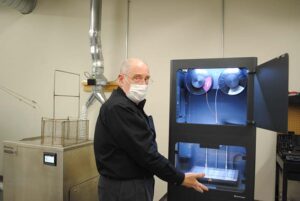 The business’ name, Vetted, stands for veteran enabled transition technology enabled design and reflects Mowins’ desire to give back to veterans.
The business’ name, Vetted, stands for veteran enabled transition technology enabled design and reflects Mowins’ desire to give back to veterans.
“We are a conduit for veterans either coming out of the services, joining the workforce or having been in the workforce and looking for a better way,” he said.
A service-disabled veteran from the U.S. Naval Academy, Mowins, 65, was never really able to serve, he said. “It really was a way for me to take my business knowledge and experience and be able to give back to veterans,” he said.
Currently, Vetted Tech has one other veteran, but Mowins estimates that in the future, he’ll be able to grow the staff to five or six.
Mowins saw the potential for 3D printing years before starting his company.
While he was still with Phillips, the company was doing research and development, creating fastening solutions and licensing companies around the world “to make what we dreamed up,” he said.
He decided the division needed a 3D printing machine back in 2004-05, to make prototypes. He said he got thinking about 3D printing after successfully quickly creating and delivering a prototype for a Rolls Royce project.
A few years later, he was on the Aerospace Industry Association’s Supplier Management Council and was taking a tour of a Honeywell facility. That company’s vice president of supply chain mentioned that he was going to need 2,000 additive manufacturing machines in his supply chain within five years.
A light went off for Mowins, when he retired, that was the industry he started looking at. He registered the company in 2019, had an exhibit at the Innovation Summit in Rochester that year to test the waters and determined there was enough of a market in the Central New York area.
He refers to his business, on Court Street Road in Syracuse, as a “service bureau.”
He explained, “An engineer or company will come to us and say, ‘Here’s my idea, here’s my CAD file. Build it.’ We don’t really do design work. We may optimize the design with what we know about how 3D printing actually works. We’re just helping somebody else get the part that they want.”
He officially started the company in December of 2019, just a few months before the pandemic hit. Attracting new clients has been a challenge since so many people are working remotely. “One of the biggest challenges we had was how do we establish ourselves and our credibility very quickly,” he said.
But Mowins also sees a silver lining. With companies having problems sourcing parts from overseas in some instances, the additive manufacturing industry here can produce and deliver products quickly.
Mike Mowins retired as president of Global Licensing for the Phillips Screw Company in May of 2019. About seven months later, he started his new business.
For Mowins, he’s part of an industry, the technology of which is ever-changing.
“It’s an interesting challenge as you get into an industry that’s going through its own evolutionary process while you’re trying to develop the customer base to understand the process,” he said.
He decided early on to go with metal machines because the technology with that material has somewhat matured, he pointed out. But on the plastics side, he said, they have a machine that’s being tweaked constantly.
The company has become ISO9001/AS9100 certified and ITAR (International Traffic in Arms Regulations) registered so it can help produce arms and aviation parts and sell them globally under license. A recent big job for the Department of Energy helped to establish Vetted Tech within the government arena. He’s finalizing paperwork that would allow them to sell through the General Services Administration. A boon for the business, too, has been a partnership with Xometry, an online company that markets a wide variety of manufacturers, like Vetted Tech to clients, broadening the potential customer base immensely.
While working at Phillips, Mowins had traveled all over the world. Now, during this new chapter, the Baldwinsville native and Phoenix resident can remain in Central New York, keep active in business and stay busy.
The difference between working for a company and owning one, he said, “is pride of ownership. It comes down to having skin in the game, and really being ultimately responsible for everything that goes on.”
He’s hopeful to take on another one or two employees before the end of 2022; push at $2 million in sales in 2023; $4 million by 2024 and eventually grow the business to five or six people and $5 million to $6 million in sales. He’d also like to add two or three more machines and become a key supplier to aerospace and medical industries.
Janice Harvey
Retired from Upstate Medical University after 25 years of service, Liverpool resident embarks on life as a consultant
Perseverance is a key word in describing Janice Harvey’s efforts to start her own business, JRR Strategies, which offers leadership and financial management consulting services.
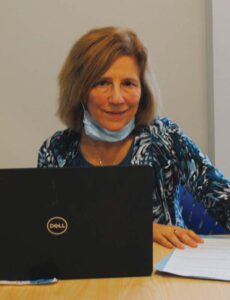 She had worked for Upstate Medical University and in June of 2021, after 25 years of service, retired as an administrator for the emergency medicine physicians.
She had worked for Upstate Medical University and in June of 2021, after 25 years of service, retired as an administrator for the emergency medicine physicians.
She explained that she oversaw a wide variety of the aspects of the business, including conducting financial analyses, budgeting, negotiating contracts, and benefits and incentive plans.
Her original retirement plan was to do consulting work in emergency medicine, but the pandemic had other plans. She said that emergency medicine visits had dropped in half in certain locales because people stayed home to avoid the possibility of getting the virus, and up until about the middle of 2021, those numbers had not bounced back.
“There wasn’t the need in that specialty, so I said, ‘Onto the next thing,’” she said.
The next thing for her was to develop her own company.
“That’s what I want to focus on, whether it’s health care or not. That’s what I think I can bring to the table,” Harvey, 69, said.
Potential clients could include nonprofits, colleges and universities and benefits corporations. For new start-ups, for example, she can assist in creating a business plan, checking out the markets, reviewing other financial documents they might have and collecting intel.
Currently, she is working to attract new clients, creating a network of contacts, participating in online lectures, building a website and finding resources through the local office of the Small Business Administration, the WISE (Women Igniting the Spirit of Entrepreneurship) program and Small Business Development Center at Onondaga Community College. She has also become a certified federal contractor, after learning that the federal government is one of the largest buyers of services in the world. This will enable her to bid on federal contracts.
Most recently, she has been certified by the Small Business Administration as a woman-owned small business., which will open other opportunities for her business. Another of her strategies is to research companies whose culture fits her, send a letter or email to the president of those businesses, introducing herself, attaching her resume and asking for the opportunity to speak with them.
“I keep up,” she said. “I just work on it every day.”
While the pandemic may have sidelined her original retirement plan to consult in the field of emergency medicine, Harvey sees a silver lining. She is seeing a greater number of requests for remote workers, which fits the plans for the Liverpool resident.
When she retired, she said she established a set of goals for herself: “to work; to volunteer, because I needed and wanted to give back; and to travel,” she said. “All that stuff feeds the soul.”
“I feel like I’m relevant. What I bring to the world of work is relevant. Anytime there’s been a bump I look for either a detour or plow through. I feel like I had a lot to offer,” she said.
Starting one’s own business can have its share of ups and downs. For Harvey, it appears that the “ups” outnumber the “downs.” Although it is taking a long time for her business to gain the momentum she’s looking for, she still finds it “exciting.”
“I love to learn new stuff. I love to do new things. I love to see how other people are trying to make it a better world as well,” she said.
She remains persistent.
“It’s going to work, because I’m not going to stop until it does,” she said.
Barbara Stone
After a 25-year career in manufacturing, Baldwinsville resident now is a leadership development coach
Barbara Stone left her 25-year career in manufacturing at the end of 2018 to, as she said, follow her passion. She launched her leadership development business, Build Your Own Path, in 2019.
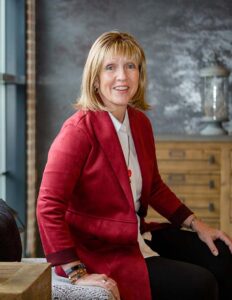 As a leadership development coach, Stone works with individual clients, organizations and teams and serves as a business coach and counselor with the WISE Center. These three lanes of the business, she explained, allow the business to remain viable, if one lane is not performing well for a time.
As a leadership development coach, Stone works with individual clients, organizations and teams and serves as a business coach and counselor with the WISE Center. These three lanes of the business, she explained, allow the business to remain viable, if one lane is not performing well for a time.
“We are all leaders of ourselves,” she said, explaining that before individuals can lead an organization, they need to better understand themselves, which can be done by focusing on their values and strengths and defining their vision so that have a purpose.
“You have to point towards where the vision is going so you bring the other people along,” she added.
Her move to start up her company came at the result of a personal journey, she said.
“Three years before I left my job, I was on a road of discovery. What did I really want to do? Who was I? I had been in manufacturing for 25 years, did everything from director of finance to running production floors. But is this really what it’s all about, to climb ladders and to make money? In the midst of my manufacturing career, after I finished my MBA, I lost myself in the process.
I was always trying to be somebody else,” she said.
She began studying resiliency and positive psychology, which she explained is the study of happiness. “If you’re happy, success will follow because you’re doing what you really want to do,” she said.
She began working with a coach and went on to take a coaching course.
“I truly believe that everybody needs a coach because we need some guidance, we need some support, we need somebody to question what’s going on,” she said.
Moving from being part of a company to owning one, she said she needed to determine how she was going to her first clients and finding the confidence. One of her first steps was to join the Women’s Business Opportunity Connection (WBOC) and the WISE Center.
To get those first clients, she reached out to her network of friends, family, acquaintances and colleagues to let them know of her new plan. Calling herself “the queen of networking,” she said she loves “to meet people. I like to engage them, to better understand their story.” Most of her clients have been with her for two years because they have developed relationships with each other, but always looking for the next client can be a challenge.
However, one of the “ups” to owning her own business is that she can be flexible with her time. She said that her husband has commented that she works harder now than when she was working for someone else.
“It’s so true. I’m constantly working to develop things. I’m always learning. The good thing is that I can continue to work on my development,” she said.
And one additional “up” is that she can bring her dog, Beau, to work with her, she said, with a chuckle.
Frank Fowler
Former Syracuse police chief now full-time CEO of security, background investigation company
Frank Fowler, 59, had joined the Syracuse Police Department in 1989, becoming chief of that department in December of 2009.
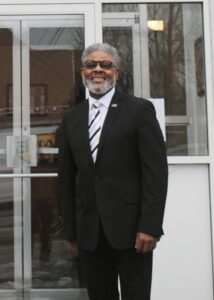 A year later, he would be approached by a friend, now business partner, John St. Denis, about starting a background investigation company. A requirement is that a private investigator be the principal of the business.
A year later, he would be approached by a friend, now business partner, John St. Denis, about starting a background investigation company. A requirement is that a private investigator be the principal of the business.
Fowler took the state PI exam, passed it and shortly thereafter, they formed the ABI Inc. (Accurate Background Investigations Inc.)
At the time, however, having just been named police chief, Fowler said he had no involvement in the company whatsoever. “I didn’t want to be conflicted in any way on the job,” he explained.
“Although I don’t believe I would have been, I didn’t want to take any chances.”
Upon his retirement in November 2018, Fowler transitioned to president and CEO of the company.
There are two components to the company; the primary one being is background investigations, with the other side being security.
“I do security consulting. If a business wants to start from scratch or change something they’re doing, they would sit down with me and say ‘What is it that we need to do to give us the best opportunity to be successful?’” he explained.
One example is the Salt City Market downtown. Fowler met with the stakeholders of the project long before it opened to discuss the concerns they had, along with those others had suggested they might have. Fowler’s years with the police department also enabled him to bring some other issues to light. They discussed bringing the neighboring Rescue Mission into the project, creating an Ambassadors Program.
These ambassadors work along with security officers that Fowler subcontracts with.
There is training for the ambassadors; giving them guidelines in how to interact successfully interact with people.
“You’re pulling a population of folks who may not have even had a job before. They may be coming from systems where their day-to-day social interactions with folks are different from the setting that you’re now going to put them into,” he explained. The training also enables everyone in the system to understand their roles. “An ambassador understands where he should hand off to security. Security understands where they should hand off to law enforcement or market management,” he pointed out.
While Fowler doesn’t not see a lot of similarities between running a company in the private sector and running a department in the public sector, there are transferable skills, one of those being the knowledge of technology and the vital role it can play.
“I left the police department at a point where we had started to utilize technology more and more. I lived through the beginning stages of shrinking resources in terms of police personnel. Through that phase, I had to look at force multipliers and the obvious one is technology. So we had started to move toward technology,” he said.
“In the police department, you’re always planning. You’re addressing situations from worst-case scenarios. You’re, often times, you’re dealing with some serious safety issues. You’re dealing with some serious quality of life issues. So, you’re addressing at the highest level of intervention or interaction,” he explained.
While that ability to plan ahead is key to success, it takes on a different perspective in a business setting.
“From a business perspective, rather than looking at worse-case scenario in terms of problem-solving, you have to identify and align yourself with that business’ idea of success,” he said.
He also has to weigh a potential client’s expectations with reality.
He won’t place security at a site until he knows what it looks like. Businesses, he said, can explain to him what they want, but when he gets to the location, he can better ascertain what his company can realistically offer.
In addition to being president and CEO at ABI, he’s also an adjunct instructor for SUNY Educational Opportunity Center in Syracuse, where he licenses and trains security guards.
In the future, he’d like to bring a security guard training school to ABI, with an emphasis on in-service training and focus on his strategy for de-escalation as it relates to security guards. ■

